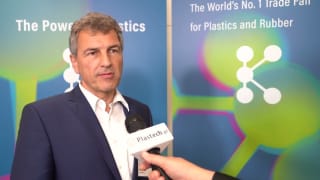
“Circular Economy” is the motto of the K 2019 and the largest common denominator in the cooperation between Wittmann Battenfeld and Zeroplast. The bio-based natural material is not only recyclable, bio-compatible, free of genetically modified organisms (GMOs) and chemical additives, but is also said to fulfill all the wishes and requirements of industrial customers. In addition to the criteria already mentioned, these include industrial series production by injection molding, a positive environmental balance, a bio-based barrier layer for cosmetics and foodstuffs, as well as competitiveness in pricing, processes and quality standards. The ingredients of Zeroplast free do not compete with animal feed or food production.
“We have invented the sustainable, all-purpose bio material”, says Friedrich Breidenbach (CEO and co-founder of Zeroplast) with a twinkle in his eye. The facts & figures about the joint development work really read like the program for a request concert organized by industrial customers from the cosmetics, food and toy sectors. This has been made possible by the expert knowledge of Wittmann Battenfeld and Buzek Plastic, Poland in injection molding and process technology, the cooperation with leading research institutions, universities and an award-winning EU Horizon 2020 project under the leadership of the Fraunhofer ISC and Fraunhofer IWKS institutes, as well as the material development carried out by Zeroplast to create Zeroplast free. Due to batch variations in natural materials, new developments in areas such as programming and process technology became necessary.
Michael Wittmann and Friedrich Breidenbach were agreed on one thing from the very beginning: “100% bio-based, zero compromise. At the K 2019, we will not present just a concept, but an almost market-ready solution. Throughout the entire development process, we have focused on meeting the requirements of our industrial customers, which is vital for application in real competitive situations. In this, we have been successful. Solutions are only sustainable if they can be brought to market in large numbers of units. Only integrated, intelligent and cost-efficient material compounds and production processes have a chance there.”
At the K 2019 Wittmann Battenfeld will demonstrate live the production of a packaging product for the cosmetics industry made of the bio-based compound Zeroplast free, which consists of no more than 3 ingredients. On the multi-component machine model EcoPower 240/1100H/130L Combimould, cosmetic jars and lids will be manufactured from this compound based entirely on natural materials, which can be recycled without losing any of its physical properties.
The jar will be injection-molded by the machine’s main aggregate, while the L aggregate produces the lid in a different color. The machine is equipped with a W842 pro robot from Wittmann, which takes a round paper label made of certified cradle-to-cradle paper from a magazine and inserts it into the moving mold half for the bottom of the jar. Next, the W842 pro removes the parts from the nozzle side and passes the jars on to a W818 robot, which inserts them into a screwing station. The W842 pro brings the lids to the screwing station, where they are united with the jars and then deposited.
The preceding in-mold labeling process reduces the complexity of the materials in the packaging product. Use of the paper label ensures efficient recycling processes and thus provides recyclable and sustainable decoration of the packaging products. Michael Wittmann and Friedrich Breidenbach comment: “Sustainable solutions must not be a sacrifice. If they are worse or less attractive, they will not be accepted by the market.”
According to Streamlined Life Cycle Assessment (LCA), Zeroplast free shows a significantly better environmental performance per kilogram than commonly available plastic materials in most impact categories examined. The material must be produced from renewable and mineral sources, be recyclable after use and decomposable in the event of improper disposal out of doors (littering), in order to avoid negative effects such as toxic substances or micro plastics. At its facility in Poland, Zeroplast develops and manufactures sustainable packaging solutions and compounds.





